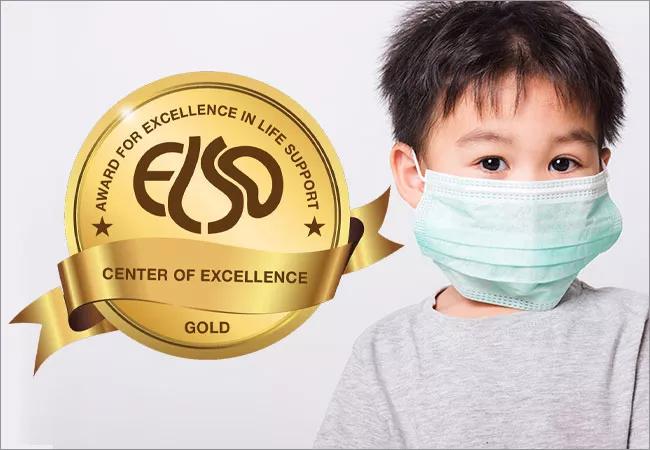Program wins gold ELSO award

Cleveland Clinic Children’s has been recognized as a recipient of the Gold Level ELSO Award for Excellence in Life Support from the Extracorporeal Life Support Organization (ELSO). The award recognizes centers that demonstrate an exceptional commitment to evidence-based processes and quality measures, staff training and continuing education, patient satisfaction and ongoing clinical care.
Advertisement
Cleveland Clinic is a non-profit academic medical center. Advertising on our site helps support our mission. We do not endorse non-Cleveland Clinic products or services. Policy
“It’s an acknowledgement of the level of organization, coordination and dedication of the caregivers from various subspecialties that form the extracorporeal membrane oxygenation (ECMO) committee at Cleveland Clinic Children’s,” says Chidiebere Ezetendu, MD, who specializes in pediatric critical care medicine. “For us, it crowns the work that we’ve done to ensure that we are ready to provide the best care, with the best possible outcomes, whenever a patient requires ECMO.”
The 25-bed Pediatric Intensive Care Unit (PICU) is comprised of 15 Pediatric Cardiovascular Intensive Care Unit (PCICU) beds and 10 PICU beds. The combined PCICU/PICU provides care for patients less than 25 years old, or patients over the age of 25 years old with congenital heart issues.
“ECMO is one of those therapies that require a truly multidisciplinary approach. Often times, it’s an intense and very collaborative effort to manage just one patient on ECMO,” says Dr. Ezetendu.
This can lead to stressful events that can, at times, overwhelm individual staff members and their ability to cope. A key aspect of the Cleveland Clinic Children’s program is providing holistic support for its caregivers. Code Lavender is a holistic care rapid response that is provided to caregivers who are in need of immediate emotional or spiritual support. Although this program can be activated by any caregiver, it is typically activated by the ECLS Coordinator or the PCICU/PICU nurse manager. Once activated, a team of holistic nurses, chaplains and volunteers arrives as soon as possible and begins working with the unit staff to provide customized care in an attempt to meet each person’s physical, emotional and spiritual needs. Services include guided imagery, instruction on relaxation exercises, aromatherapy for personal use, Reiki, Healing Touch™, light massage therapy, and spiritual and emotional support through active listening. PCICU/PIC caregivers are also supported through debriefing sessions conducted by the Palliative Medicine Department.
Advertisement
“We’re continually looking at our practices and the way we deliver care at the bedside,” says Angela Jarden, RN, ECLS Program Coordinator. “We’ve instituted different quality improvement projects, such as looking to decrease the amount of blood we’re taking from patients for laboratory work and cutting down on the number of times that we access the central line to help reduce the risk of bloodstream infections.”
Maintaining optimal anticoagulation for ECMO patients is another critical challenge. Heparin use carries risks, including resistance and heparin-induced thrombocytopenia. The Cleveland Clinic Children’s team conducted a retrospective analysis of its pediatric ECMO patients receiving heparin or bivalirudin to ensure optimal anticoagulation. “We found that bivalirudin is feasible, safe and reliable. Although it is actually more expensive than heparin per dose, when you add-in the costs for lab work and antithrombin replacement, it is actually more cost effective,” says Jarden.
Whenever a patient may potentially require ECLS therapy or as soon as possible following an emergent cannulation for ECLS therapy, a 12-page book titled “A Patient’s Guide to ECMO” is given to the family. The book explains, in simple terms and pictures, the many aspects of the ECLS therapy. Family members are encouraged to stay at the bedside of PICU/PCICU patients, and are strongly encouraged to participate in daily multidisciplinary rounds.
“Overall, we’re pleased to receive this honor, and grateful to all the caregivers who help support these patients and their families,” says Dr. Ezetendu.
Advertisement
Advertisement

Findings hold lessons for future pandemics

One pediatric urologist’s quest to improve the status quo

Overcoming barriers to implementing clinical trials

Interim results of RUBY study also indicate improved physical function and quality of life

Innovative hardware and AI algorithms aim to detect cardiovascular decline sooner

The benefits of this emerging surgical technology

Integrated care model reduces length of stay, improves outpatient pain management

A closer look at the impact on procedures and patient outcomes